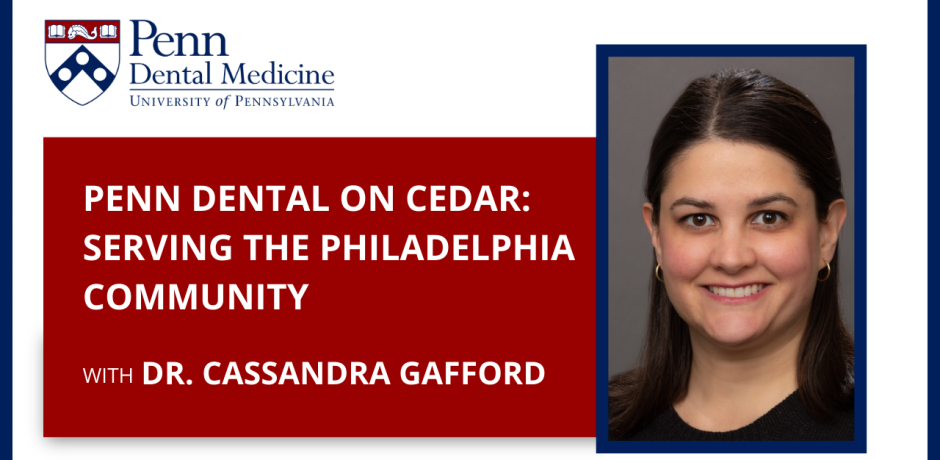Maybe you’ve felt a sharp pain in your mouth while trying to enjoy your morning cup of coffee. Maybe you chew your steak on one side of your mouth instead of the other. Maybe brushing your teeth hurts. Any number of everyday situations might cause people to wonder, “Why are my teeth sensitive?”
If you’ve been asking that question, read on. Penn Dental Medicine at PHMC Public Health Campus on Cedar has answers about why it’s happening, and what you can do about it.
What Causes Tooth Sensitivity?
 To understand why your teeth are sensitive, you need to know about the anatomy of a tooth.
To understand why your teeth are sensitive, you need to know about the anatomy of a tooth.
The tooth’s hard outer layer is the enamel. Directly below the enamel is a layer of dentin. Inside the dentin, microscopic, hollow canals called tubules go to the pulp, the tooth’s nerve-filled core. When tooth enamel erodes, these tubules get exposed and are left unprotected against such stimuli as heat, cold, and pressure.
Sometimes, a tooth’s root—the part below the gum line—can also become exposed, which also leads to tooth sensitivity. If the gum line recedes, or if a tooth is missing altogether, sensitivity can grow worse.
Common, specific causes of sensitive teeth include:
- Gum disease
Gum disease (periodontal disease) can cause the gums to pull away from the teeth, exposing their roots and causing sensitivity.
- Tooth decay
Tooth decay occurs when tooth enamel breaks down in the presence of harmful bacteria and acid. Enamel erosion exposes dentin, causing sensitivity.
- Tooth grinding
People who grind or clench their teeth, awake or asleep, may experience enamel wear and thus increased tooth sensitivity.
- Cracked or broken teeth
Teeth that are damaged or fractured can have exposed dentin, causing sensitivity.
- Poor oral hygiene
People who grind or clench their teeth, awake or asleep, may experience enamel wear and thus increased tooth sensitivity.
Insufficient dental care, improper brushing techniques, and inadequate flossing can all contribute to plaque buildup, gum disease, and, ultimately, tooth sensitivity.
Should I Be Worried if My Teeth Are Sensitive?
If your teeth feel sensitive—pay attention.
Occasional sensitivity is normal. Consistent or intense sensitivity, however, could be a sign of a more serious issue. Your gums may be receding. You might have a cavity or a cracked tooth. Some other issues could be the cause.
So if you’re wondering and worrying,”Why are my teeth sensitive?” talk with your dentist. Your dentist can determine the causes of your sensitive teeth, and explore suitable treatment options with you.
Can Sensitive Teeth Go Away?
 Simply because your teeth are sensitive now doesn’t mean they’ll feel sensitive forever. In many cases, tooth sensitivity becomes significantly less bothersome or goes away completely with proper care and treatment.
Simply because your teeth are sensitive now doesn’t mean they’ll feel sensitive forever. In many cases, tooth sensitivity becomes significantly less bothersome or goes away completely with proper care and treatment.
Identifying the underlying cause of the sensitivity—whether it’s tooth decay, enamel erosion, gum recession, dental infections, or something else—is the first step. Following the advice your dentist gives you is the next.
What is the fastest way to cure sensitive teeth? Because sensitive teeth causes vary, no one-size-fits-all “fastest” solution exists. However, some steps you can take on your own include:
- Using a soft-bristled toothbrush and proper brushing techniques.
Soft bristles are less abrasive, reducing your risk of enamel erosion or gum recession. And brushing in small, circular motions, and holding your brush at a slight angle, helps remove plaque without undue, potentially damaging pressure on your teeth.
- Brushing with desensitizing toothpaste.
Specially formulated with such active ingredients as potassium nitrate, desensitizing toothpaste, with consistent use, can help build a protective layer over your teeth and remineralize your enamel.
- Avoiding acidic food and drink.
Citrus fruits, sodas, certain juices, and other acidic foods and drinks can wear away your tooth enamel. Minimizing your teeth’s contact with them protects your enamel. It may also contribute to your overall health by better balancing your diet.
 In addition, your dentist may recommend such treatments as fluoride applications, dental bonding, or dental sealants to protect and strengthen your teeth.
In addition, your dentist may recommend such treatments as fluoride applications, dental bonding, or dental sealants to protect and strengthen your teeth.
It may take some time and consistent care. But with the right approach and professional guidance, you can experience relief from tooth sensitivity.
Are you ready to ask a dentist, “Why are my teeth sensitive, and how can we make it stop?” Schedule your appointment at PDM at PHMC on Cedar online now or call us at 855-887-9229.






